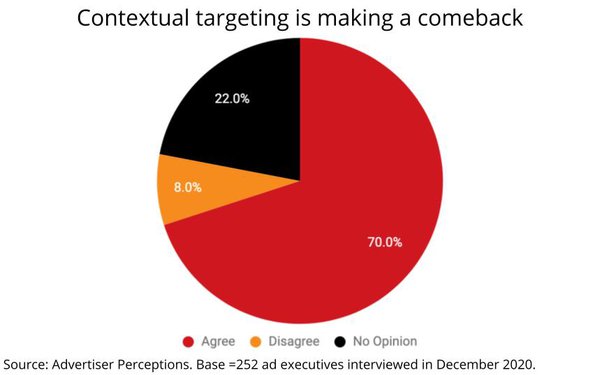
In light of the deprecation of mobile user identity trackers, the
vast majority of mobile advertisers and media buyers believe contextual targeting is resurgent.
While contextual targeting has never gone away, it took a backseat to so-called "deterministic
tracking" technologies such as the the advertiser identifier (IDFA) that Apple has begun turning control back to iPhone users for. The move is expected to compromise the identity tracking used by
social media platforms such as Facebook to target explicit users.
As a result, 70% of mobile advertisers/agency media buyers believe contextual targeting is making a comeback, according to a
survey of 252 executives conducted in December 2020 by Advertiser Perceptions.
“Walled gardens, especially the large social platforms, have the resources to adapt to privacy and
regulatory changes,” states Advertiser Perceptions Executive Vice President-Business Intelligence Lauren Fisher, adding: “But they need to reassure advertisers with better solutions for
brand safety and protections against fraud, in addition to proving their privacy compliance.”
advertisement
advertisement
As a result, the study found mobile advertisers are poised to spend more on content
environments with overt contextual signals, including gaming, content aimed at children, lifestyle and entertainment content.
The study also reveals that ad executives are becoming more
tolerant of less precise data, especially mobile location tracking.
"Approximate data is 'good enough'," Advertiser Perceptions concludes in the report, citing that 57% of respondents now
consider "approximate data" a good substitute for GPS tracking.
"In fact, by the end of 2020, 37% of advertisers had already decreased or discontinued location-based data solutions because
fewer consumers were out and about and privacy restrictions loomed," the report notes, adding: "Confidence in the new world of mobile targeting differs by business type. Advertisers promoting
online-centric revenue models are more likely to be confident without location-specific data than their brick-and-mortar-focused counterparts – 71% of mobile app businesses and 68% of those
selling goods and services online are confident, whereas only 50% of omni-channel sellers and 27% of those representing offline-only businesses are confident."